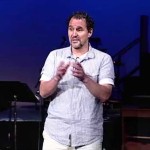We run our website the way we wished the whole internet worked: we provide high quality original content with no ads. We are funded solely by your direct support. Please consider supporting this project.
Why Are We So Mired in Violence?
In his marvelous little book entitled The Great Divorce, C. S. Lewis envisioned hell as a realm in which people are forever moving farther away from one another. Hell is the ultimate, cosmic, suburban sprawl! It seems to me that Western civilization is diving headlong into Lewis’ hell, and we’re being pulled there by the powers of darkness.
When you combine our relationship-eroding consumerism with our stress on individual freedoms and rights, you can understand why most Westerners have many acquaintances but few (if any) deeply committed relationships that echo the love of the triune God, which I highlighted in the previous two posts here and here.
So why doesn’t the human community mirror the love of the triune God? Why are we so prone to violence, judgment, and division? It’s really not that complicated. It’s because we have individually and as a race severed our life-giving relationship with our Creator. It’s impossible for us to be rightly-related to one another on a consistent basis if we’re wrongly-related to our Creator (1 John 4:20).
This is evident in the biblical account of how the rebellion against God began. The moment Adam and Eve rebelled, they concealed themselves from each other and hid from God (Gen 3:7-10). When confronted by God about his sin, Adam first accused Eve and then God for giving Eve to him (Gen 3:12). God then woefully proclaimed that because of their rebellion, the beautiful “one flesh” relationship he wanted couples to enjoy would be reduced to a manipulative power struggle. The wife would seek to manipulate and dominate her husband, and the man would end up lording over the woman, presumably because he tends to be physically stronger (vs. 16).
The story goes downhill from there. Adam and Eve’s first child, Cain, murdered their second child, Abel, out of jealousy (4:8). As violence always does, this set in motion other violent impulses, to the point that God had to threaten vengeance upon anyone who killed Cain just to keep others from murdering him (vs. 14-15). Fast forward eight verses and you find Lamech, a descendent of Cain, boasting that his thirst for vengeance is ten times greater than Cain’s.
Within a few millennia (so far as we can guess) the world became so “full of violence” the Lord had to destroy humankind and start over with Noah’s family (Gen. 6:11). Yet, this drastic step fell short of putting an end to violence. Indeed, the rest of the biblical narrative and the whole of human history is a prolonged testimony to how our broken relationship with God invariably results in broken, violent-tending relationships with others.
All of this testifies to the truth that we can’t relate to each other the way God intends unless we’re in relationship with God himself the way he intends. We can only replicate the love of the Trinity in our relationships with one another when we are participating in the love of the Trinity. It also testifies to the truth that since the rebellion, we have been living under the relationships-fracturing tyranny of the powers of darkness, who first seduced us to join in their rebellion.
Category: General
Tags: Adam and Eve, Cain and Abel, Flood, Love, Relationships, Trinity, Violence
Topics: The Problem of Evil
Related Reading

A Word About Sharing the Gospel From an Atheist
Jen J over at A Deeper Family wrote a little piece about how she felt convicted after this video was played during a sermon at her church. She makes some good points. Penn Jillette is a famous atheist, and I’m sure he encounters a lot of Christians trying to persuade him to come to God. It’s…

Sermon Clip: Love: It’s All About the Cross
In this sermon clip, Greg Boyd talks about how Colossians 3:14 and the definition of love. God designed creation so that we would live in community with God and express God’s love towards each other and creation. However, sin disconnected us from God. In this sermon, Greg shows how we were created in the image…

Tardy
This is the sermon clip entitled Honest to God that should have appeared last week. Sorry. Sometimes life gets a bit busy. In this short sermon clip, Greg introduces the idea that one of our base needs is to be understood and loved fully for who we are. The full sermon discusses how in order…

Podcast: If You Could’ve Killed Hitler, Wouldn’t You?
Greg challenges the intuitively appealing notion of killing Hitler and thereby preventing the massacre of millions of people. http://traffic.libsyn.com/askgregboyd/Episode_0326.mp3 —Edvard Munch, “The Murderer,” 1910

The Greatest Mystery of the Christian Faith
God has always been willing to stoop to accommodate the fallen state of his covenant people in order to remain in a transforming relationship with them and in order to continue to further his sovereign purposes through them. Out of love for humankind, Scripture tells us, Jesus emptied himself of his divine prerogatives, set aside…

Christus Victor Atonement and Girard’s Scapegoat Theory
Many of the major criticisms of Crucifixion of the Warrior God that have been raised since it was published four weeks ago have come from folks who advocate Rene Girard’s understanding of the atonement. A major place where these matters are being discussed is here, and you are free to join. Now, I have to…

